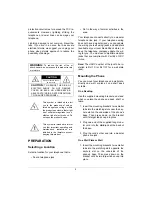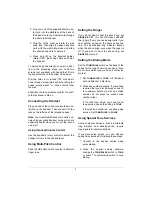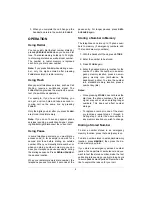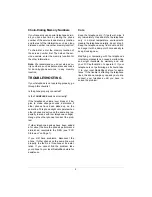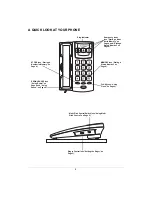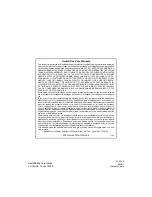
3
2. Plug one end of the supplied short modu-
lar cord into the
LINE
jack at the back of
the base. Route the modular cord through
the strain relief channel.
3. Plug the cord’s other end into the wall
plate jack, then align the base’s keyhole
slots with the wall plate studs and slide
the phone downward to secure it.
4. Press and lift up the handset holder,
rotate it 180°, then snap it back so it holds
the handset.
To mount the phone directly on a wall, in addi-
tion to the preceding steps, you need two
screws (not supplied) with heads that fit into
the keyhole slots on the bottom of the base.
Drill two holes 3
15
/
16
inches (100 mm) apart.
Then thread a screw into each hole, letting the
heads extend about
5
/
16
inches (8mm) from
the wall.
Substitute the long modular cord for the short
cord mentioned in step 2.
Connecting the Handset
Plug one end of the coiled cord into the modu-
lar jack on the handset. Then connect it to the
jack on the left side of the telephone base.
Note: Your local RadioShack store sells a va-
riety of longer coiled handset cords, which are
especially useful when you mount the phone
on a wall.
Using Handset Volume Control
Use the handset’s rotary control to adjust the
handset volume to the desired level.
Using Multi-Pitch Control
Slide the
1/2/3
pitch switch to select a different
ringer tone.
Setting the Ringer
If you do not want to hear the phone ring, set
RINGER
to
OFF
. You can still make calls with
the ringer off, and you can answer calls if you
hear another phone on the same phone line
ring. The bar-shaped ring indicator flashes
when the phone rings, even when the ringer is
off. If you want to hear the phone ring, set
RINGER
to
HI
or
LO
.
Setting the Dialing Mode
Set the
TONE/PULSE
switch on the back of the
phone for the type of service you have. If you
are not sure which type you have, do this sim-
ple test.
1. Set
TONE/PULSE
to
TONE
. Lift the hand-
set and listen for a dial tone.
2. Press any number except
0
. If your phone
requires that you dial an access code (9,
for example) before you dial an outside
number, do not press the access code
number either.
If the dial tone stops, you have touch-
tone service. Leave the setting to
TONE
.
If the dial tone continues, you have pulse
service. Set
TONE/PULSE
to
PULSE
.
Using Special Tone Services
Some computer services, such as alternate
long distance and bank-by-phone, require
tone signals for communications.
If you have pulse service, you can still use
special tone service by following these steps.
1. Connect to the special service using
pulse dialing.
2. When the special service answers,
change the
TONE/PULSE
switch to
TONE
,
or press
*
to temporarily switch to tone
dialing.
Summary of Contents for 02A01
Page 7: ...7 NOTES ...


